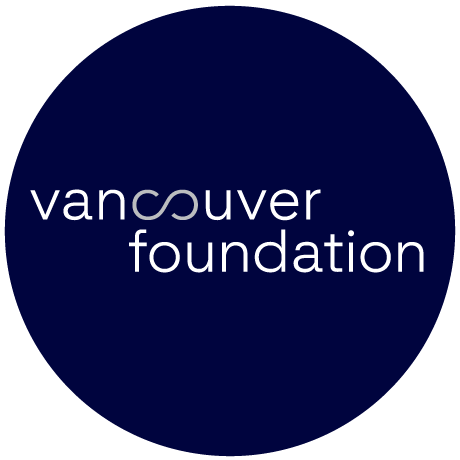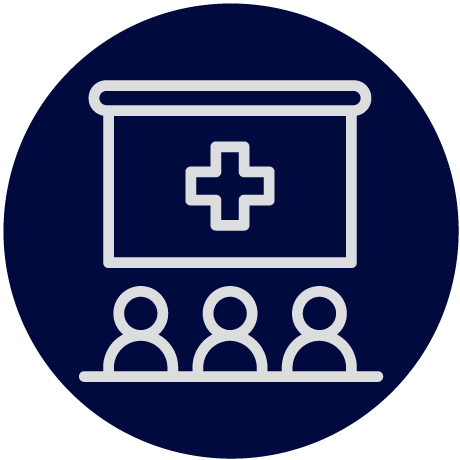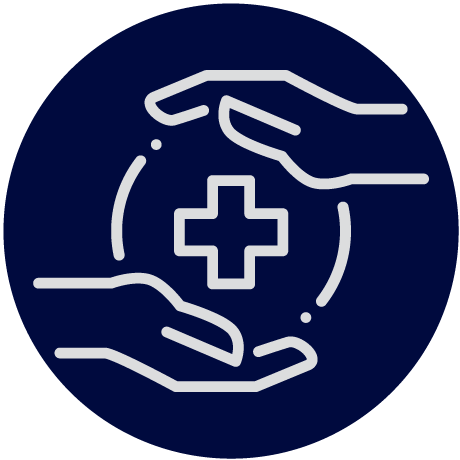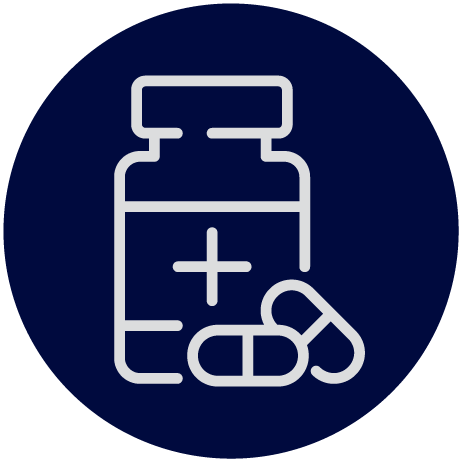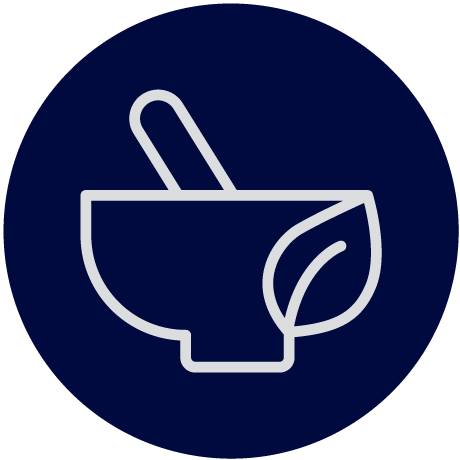To respect the data sovereignty of our partners, most of the project details are available to partners only. Please feel free to contact the UPROOT team should you have any questions. If you are meant to have access to any of these projects, please email the team at uproot.team@ubc.ca.
Comprehensive Resource for Healthy Medication Practices
The Health Services Centre (HCS) for a BC First Nation supports the community with primary and emergency care, public health programming and medications. The Centre identified a clear community for proper resources aimed at improving medication practices. Limited guidance and access to resources regarding medication practices can lead to technical and logistical concerns that can impact patient care if not appropriately addressed. To address this need, the HCS partnered with the Entry-to-Practice PharmD Program at the University of British Columbia to develop a Comprehensive Resource for Healthy Medication Practices (the Resource).
The goal of this Resource is to provide a comprehensive tool for the First Nation to improve the community’s culturally safe, effective and evidence-based management of medication ordering, storage, dispensing, education and disposal. These five categories were identified by the authors as encompassing the scope of the community’s expressed needs. The Resource has been designed to be easily accessible by staff both current and future, and specifically relevant to the needs of the First Nation and the Health Services Centre. An environmental scan and literature review were conducted, examining existing resources pertaining to culturally safe medication practices in Indigenous communities. This data was used to create a questionnaire to identify current procedures, community opinions and community suggestions pertaining to medication practices in the First Nation. Community engagement with members of the First Nation and staff at the Health Services Centre also took place through an in-person townhall and interviews. The project members developed each section of the resource based on interview and questionnaire data. The Resource was reviewed by university and community partners.
Community Partner(s)
Carolyn MacKinnon
Student(s)
Filip Zekic, E2P PharmD Student
Mojan Fazelipour, E2P PharmD Student
Jessie Li, E2P PharmD Student
Granting Agency/Partner(s)
UBC Community-University Engagement Support Fund
Building a Community-Owned Pharmacy for a BC First Nation
A BC First Nation has identified a need to increase access to culturally safe pharmacy services for the community. Currently, the Nation’s pharmacy needs are serviced by a singular pharmacy. As a profession, pharmacy is deeply rooted in a colonial and Eurocentric view of western values, evidence-based medicine, and a transactional approach to care provision. In response to the Truth and Reconciliation, UNDRIP, and In Plain Sight, self-determination and self-governance is an increasing priority for communities. As communities move towards development of their own Indigenous-owned and operated solutions, pharmacy can play an important role.
This project developed a report describing current pharmacy services and practices in the community and identifying opportunities for further development of a community-owned, Nation-based pharmacy.
Methodology: The report for this project was created based on a review of relevant literature and virtual interviews with community members and local healthcare professionals. An outline of the current landscape of pharmacies as well as options and considerations for the opening and operation of a Nation-owned pharmacy are explored.
Community Partner(s)
Glenda Phillips
Student(s)
Mel Tsai, E2P PharmD Student
Aya Al-Nuaimi, E2P PharmD Student
Granting Agency/Partner(s)
None
Improving Pharmacy Access with a BC First Nation Community Health Centre (CHC)
The responsibilities of a pharmacist are well established within a Western healthcare framework; however, a pharmacist’s role within Indigenous-led healthcare is unclear. Indigenous-led healthcare services are designed by the community for the community and can be tailored to address specific community needs. Rural and remote communities often face significant barriers to accessing care because of geographic distances or chronic healthcare staff shortages. Providing access to a variety of healthcare services directly within the community can help address these challenges. Indigenous control over healthcare delivery is essential to honouring self-determination, addressing health inequities, and ensuring culturally safe care.
This research is to investigate how to improve pharmacy access in a remote First Nations community by understanding patient and care provider perspectives on the importance of various pharmacy services at an individual and community level.
Community Partner(s)
Jessica Frank
Student(s)
Madison Runa, E2P PharmD Student
Granting Agency/Partner(s)
UBC Community-University Engagement Support Fund
Improving Palliative Care Services in a Rural BC First Nation
A rural BC First Nation has been able to come up with innovative solutions to address the increased healthcare demands such as improving high speed internet access to facilitate access to telehealth. However, there are still significant barriers that remain that make it difficult for the community to provide its surging palliative care population with optimal care. Indigenous patients already experience unique social, cultural and economic barriers to accessing quality healthcare, including palliative care. The modern day effects of colonialism, Indian hospitals, and residential schools are demonstrated through the health inequities present in Indigenous communities. Indigenous patients are more likely to have a chronic health condition such as diabetes, cancer, and have complications sooner that leads them to pursue palliative care. For many Indigenous communities, death is not just a physical process, but a social and spiritual event. As a result, significant improvements need to be made to change the course of declining palliative care services.
According to our community partner, the deterioration in care is due to many factors such as communication breakdowns, lack of integration of Indigenous cultural practices and insufficient staffing support. As many of these deficiencies in care can be resolved through improved integration of the various palliative care services available within the community, our project aims to bridge the gap between the different healthcare facilities. These include the local health department, Vancouver Coastal Health (VCH) palliative care team, the pharmacy and local practitioners.
Community Partner(s)
Patricia Bobb
Student(s)
Yaksh Shah, E2P PharmD Student
Anthony Prpic, E2P PharmD Student
Alexa Spadafora, E2P PharmD Student
Granting Agency/Partner(s)
None
iixsatimutilh – We are Medicine for Each Other
A rural BC First Nation has identified an opportunity for general pharmacy and specialized Substance Use Disorder (SUD) services to be implemented and led by their community. They are currently building a SUD clinic with emphasis on integrating both Indigenous and Western models of care. The grounds of the project is being built around a local saying “iixsatimutilh” translating to “we are medicine for each other.” Providing SUD care following this saying incorporates the high regard of family, community, and traditional health in the community. The project aims to develop culturally-safe general as well as specialized SUD pharmacy services that can be offered to patients in the community.
Community Partner(s)
Glenda Phillips
Student(s)
Carter Coblenz, E2P PharmD Student
Supreet Herr, E2P PharmD Student
Farzad FahimiYeganeh, E2P PharmD Student
Granting Agency/Partner(s)
Canadian Foundation for Pharmacy (CFP) Innovation Fund
Cultural Harvest Program
The Cultural Harvest Program is a youth program aimed at enhancing the mental health and well-being of Indigenous youth in a rural first nations community. Rooted in traditional values and practices, the program aims to strengthen connections with culture, spirituality, and the land, ultimately reducing rates of youth incarceration and promoting healthy coping mechanisms. An environmental scan, which included both physical and digital resources, provided insights to inform program development. The program’s pilot phase will involve a small group of youth, with plans to expand to accommodate larger cohorts and a variety of land-based activities. By fostering cultural and social engagement, the Cultural Harvest Program seeks to empower the rural first nations youth to express their thoughts and emotions in a safe environment.
Community Partner(s)
Joanne John
Student(s)
Parker Dowhy, E2P PharmD Student
Ally Coates, E2P PharmD Student
Jasneek Manhas, E2P PharmD Student
Granting Agency/Partner(s)
None
iixsatimutilh – We Are Medicine For Eachother: A Traditional Medicines Program
Traditional medicines hold profound significance within numerous Indigenous communities, serving as integral components of cultural identity and holistic wellness practices. Traditional medicine assumes a central role in fostering the physician, mental, spiritual and emotional health and vitality of its members. An esteemed healer within the community, has devoted decades sharing her profound knowledge regarding the medicine that comes from the land, witnessing firsthand the transformative impact on individuals. She defines traditional medicine as a culmination of plants, healing, song, and dance.
She emphasizes that traditional medicine and healing is about “the energy, the working and the sharing that all community members partake in to rid themselves of illness.”
Much of this knowledge is passed down within the community by word-of-mouth, and thus a program is needed so that this wealth of knowledge can be taught and shared accurately and in a structured manner. She is dedicated to guiding learners on how to use traditional medicines and to understand when these medicines are the right option. Through her teachings, individuals are empowered to recognize the appropriateness of these remedies and engage in healing practices that resonate authentically with their cultural heritage and community traditions.
Community Partner(s)
Rhonda Schooner
Student(s)
Ariana Javer, E2P PharmD Student
Jiven Basi, E2P PharmD Student
Lana Omazic, E2P PharmD Student
Granting Agency/Partner(s)
Canadian Foundation for Pharmacy (CFP) Innovation Fund
Co-Developing a Culturally Safe Engagement Framework with Urban Indigenous Partners
There is a long-standing history of improper engagement with Indigenous individuals that often lacks respect, humility, and understanding of Indigenous protocols. To rebuild trust with people, researchers must commit to reconciliation and develop strategies for ethical engagement. The UPROOT team has more than 10 years of history working with individual Nations to decolonize and Indigenize pharmacy education and practice. The team has primarily worked with individual Nations, but their next project will focus on Urban Indigenous people which represent various First Nations, Métis, and Inuit people. Due to the diversity, UPROOT lacks clarity on the proper principles of engagement in lieu of Nation-specific approaches.
Community Partner(s)
None
Student(s)
Brandon Whitmore, E2P PharmD Student
Tia De Groot, E2P PharmD Student
Granting Agency/Partner(s)
Vancouver Foundation
